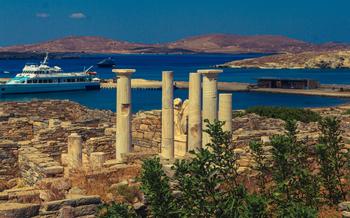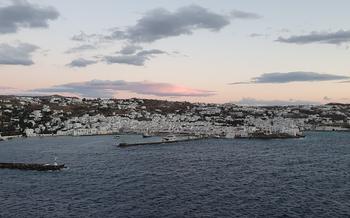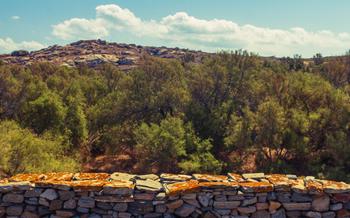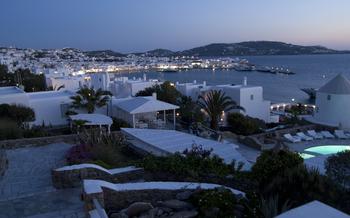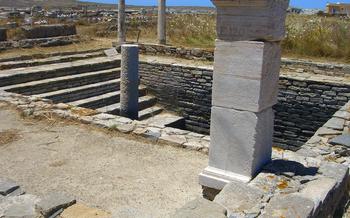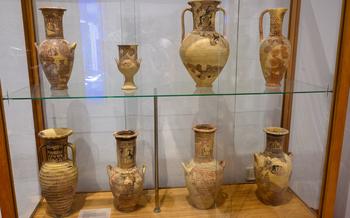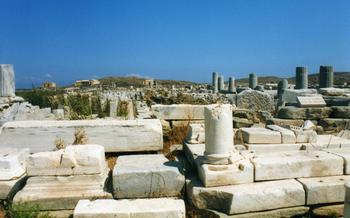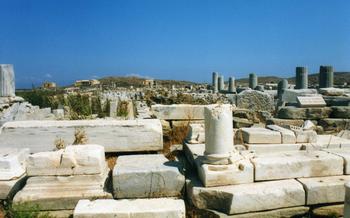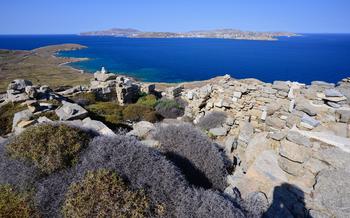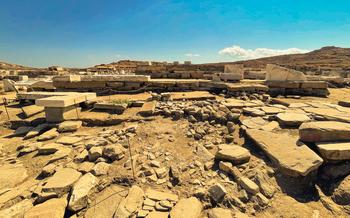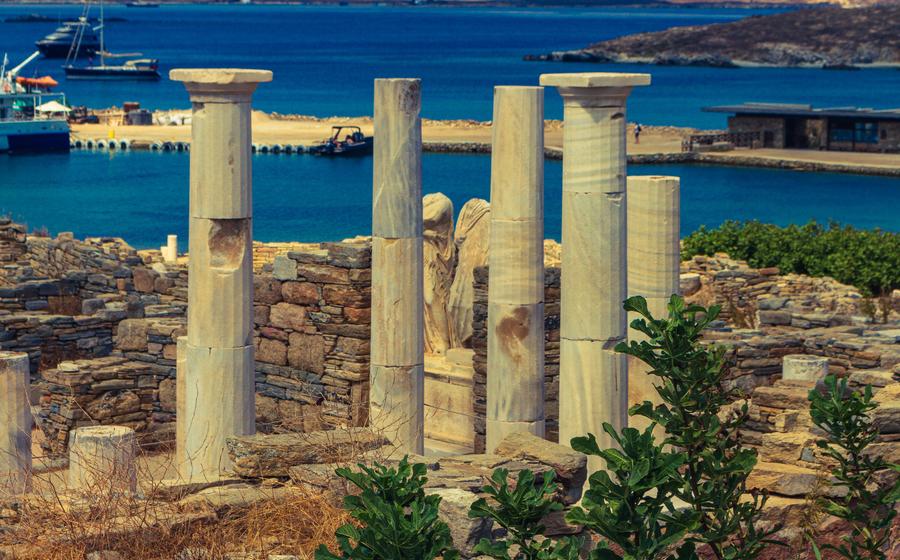
Cleopatra's House at Delos
- Delos: An Ancient Mythological Island
- Reaching Delos: A Journey to the Past
- Unveiling Cleopatra's House: A Glimpse into Luxury
- Exploring the Archaeological Museum: Delos's Treasures
- The Terrace of the Lions: Majestic Guardians
- The Sacred Lake: A Place of Purification
- The House of Dionysus: Revelry and Celebration
- The Agora of the Italians: A Bustling Marketplace
- The Propylaea: A Grand Entrance
- The Temple of Apollo: A Divine Abode
- The Naxian Terrace: A Scenic Promenade
- The Theater of Delos: A Stage for Ancient Drama
- The Sanctuary of Artemis: Honoring the Goddess of the Hunt
- The House of Hermes: A Merchant's Abode
- Insider Tip: Embracing the Island's Charm
Delos: An Ancient Mythological Island
Delos, a small, uninhabited island in the heart of the Aegean Sea, holds a significant place in Greek mythology and history. According to ancient legends, Delos was the birthplace of the twin gods Apollo and Artemis, children of Zeus and the goddess Leto. The island was considered sacred and served as a sanctuary where pilgrims from across the ancient world flocked to pay homage to these deities. Archaeological excavations have uncovered the remains of temples, altars, and other structures, providing a glimpse into the island's rich religious past. In recognition of its exceptional cultural and historical value, Delos was designated as a UNESCO World Heritage Site in 1990.
Reaching Delos: A Journey to the Past
Delos, the sacred island of ancient Greece, beckons visitors with its rich history and archaeological treasures. To reach this captivating destination, embark on a scenic ferry ride from Mykonos, the vibrant neighboring island. Several ferry companies offer regular services, with departures throughout the day. Fares typically range from 20 to 30 euros, and the journey takes approximately 30 to 45 minutes, providing ample time to soak in the stunning views of the Aegean Sea.
To ensure a smooth and enjoyable visit, plan your trip carefully. Choose the morning or late afternoon ferries to avoid the midday heat and crowds. Alternatively, consider renting a private boat for a more personalized and flexible experience. Guided tours are also available, offering a wealth of insights into Delos's history and significance.
Pack essential items for your Delos adventure, including plenty of water, sunscreen, and comfortable walking shoes. A hat and sunglasses are also recommended to protect yourself from the sun's glare. Remember to bring a camera to capture the island's captivating beauty and share your memories with the world.
Unveiling Cleopatra's House: A Glimpse into Luxury
In the heart of Delos, nestled amidst the remnants of ancient history, lies Cleopatra's House, a testament to the opulence and extravagance of the Ptolemaic dynasty. As one of the most well-preserved private residences on the island, it offers a rare glimpse into the lavish lifestyle of the Ptolemaic rulers.
With its mosaic floors adorned with intricate patterns, frescoes depicting scenes from Greek mythology, and a private bathing area complete with a marble bathtub, Cleopatra's House exudes an air of grandeur and luxury. The sheer size and elaborate decorations of the house reflect the wealth and power of the Ptolemaic dynasty, which ruled Egypt and much of the Mediterranean during the Hellenistic period.
Cleopatra's House serves as a tangible reminder of the close ties between Delos and Egypt during the Ptolemaic era. The island was a significant trading hub and a religious center, and the Ptolemies played a vital role in its development and prosperity. The construction of Cleopatra's House on Delos further solidified the connection between the two regions and showcased the influence of the Ptolemaic dynasty in the Aegean Sea.
Ongoing archaeological work at the site is meticulously restoring and preserving Cleopatra's House, ensuring that future generations can continue to marvel at its splendor. As visitors explore the ruins of this opulent residence, they are transported back in time, experiencing firsthand the grandeur and excess that characterized the Ptolemaic era.
Exploring the Archaeological Museum: Delos's Treasures
Housed in a modern building near the ancient harbor, the Archaeological Museum of Delos is a treasure trove of artifacts that provide a glimpse into the rich history and culture of the island. The museum's collection spans various periods, from the Neolithic era to the Roman period, showcasing the diverse influences that have shaped Delos.
Among the highlights of the collection are the Naxian Sphinx, a majestic marble statue dating back to the 6th century BC, and the Winged Victory of Delos, a Hellenistic masterpiece that once stood atop a column in the Sanctuary of Apollo. The Lion Terrace, featuring a row of seven marble lions, is another iconic artifact that symbolizes Delos's power and prosperity.
The museum also houses an impressive collection of pottery, jewelry, and sculptures, each piece offering insights into the daily lives, religious practices, and artistic traditions of the ancient Delians. Visitors can admire intricate vases adorned with mythological scenes, delicate gold jewelry, and marble statues depicting gods, goddesses, and heroes.
Admission to the museum is affordable, and guided tours are available for those who wish to delve deeper into the fascinating stories behind the artifacts. The museum is a must-visit for anyone interested in exploring the rich cultural heritage of Delos and gaining a deeper understanding of its significance in the ancient world.
The Terrace of the Lions: Majestic Guardians
Standing proudly on Delos, the Terrace of the Lions is an iconic symbol of the island's power and prosperity. A row of seven majestic marble lions, each representing a different Cycladic island, lines the terrace, their imposing presence capturing the attention of visitors. These regal creatures, carved with intricate detail, embody strength, courage, and the fierce protection of Delos.
The purpose of the terrace remains a subject of debate among scholars. Some believe it served as a grand entrance to the Sanctuary of Apollo, while others suggest it was a place for public gatherings or religious ceremonies. Regardless of its exact function, the Terrace of the Lions undoubtedly played a significant role in showcasing Delos's wealth and influence.
The terrace offers breathtaking views overlooking the ancient harbor and the shimmering Aegean Sea. Visitors can imagine the grandeur of Delos in its heyday, as ships from across the Mediterranean docked in the harbor, bringing traders, pilgrims, and visitors from distant lands. The Terrace of the Lions stands as a testament to the island's rich history and enduring legacy.
The Sacred Lake: A Place of Purification
The Sacred Lake, situated on the southeastern edge of Delos, holds a significant place in Greek mythology and religious practices. According to legend, the lake was where Leto, the mother of Apollo and Artemis, gave birth to her divine twins. This sacred event imbued the lake with a profound sense of purity and healing, making it a popular destination for pilgrims seeking spiritual rejuvenation.
Archaeological excavations have revealed the remains of several temples, altars, and statues surrounding the lake, indicating its importance as a religious center. The Temple of Leto, dedicated to the goddess of motherhood, stands as a testament to the lake's sacred associations. Visitors can still admire the temple's well-preserved Doric columns and intricate sculptures, offering a glimpse into the architectural grandeur of ancient Delos.
The serene atmosphere and natural beauty of the Sacred Lake invite visitors to relax and reflect. The tranquil waters, surrounded by lush vegetation and ancient ruins, create a peaceful ambiance that encourages introspection and spiritual contemplation. Take a moment to sit by the lake's edge, soak in the tranquil surroundings, and let the serenity of the place wash away the stresses of modern life.
The House of Dionysus: Revelry and Celebration
Amidst the ancient ruins of Delos, the House of Dionysus stands as a testament to the lavish lifestyle and hedonistic spirit of the island's wealthy residents. This exceptionally well-preserved private residence, dating back to the 2nd century BC, offers a glimpse into the world of ancient Greek revelry and opulence.
The highlight of the House of Dionysus undoubtedly lies in its intricate mosaic floors, which depict vibrant scenes from Greek mythology, particularly those involving the god Dionysus, the patron of wine, revelry, and theater. These exquisite mosaics showcase the artistic prowess of the ancient Greeks and bring to life tales of divine adventures, mythological creatures, and mythical feasts.
Beyond its stunning mosaics, the House of Dionysus boasts an array of luxurious features that speak to the affluence of its inhabitants. A private bathing area, complete with a mosaic-tiled pool and frescoed walls, provided a sanctuary for relaxation and rejuvenation. The house also featured a spacious dining room, adorned with colorful frescoes and marble floors, where lavish banquets and symposia were likely held.
The House of Dionysus stands as a symbol of the hedonistic and celebratory aspects of ancient Greek culture. It invites visitors to imagine the lively gatherings, the flowing wine, and the infectious laughter that once filled its halls. As you explore this remarkably preserved residence, you'll gain a deeper appreciation for the vibrant and opulent lifestyle enjoyed by the elite of ancient Delos.
The Agora of the Italians: A Bustling Marketplace
The Agora of the Italians, situated in the heart of Delos, served as the bustling commercial center of this ancient metropolis. Here, traders from across the Mediterranean converged, exchanging goods and ideas, contributing to the island's vibrant economic and cultural tapestry. Archaeological excavations have unearthed the remains of shops, warehouses, and public buildings, offering a glimpse into the bustling activities that once took place within this marketplace.
Among the notable discoveries are inscriptions and artifacts that shed light on the diverse population and extensive trade networks that connected Delos to far-flung regions. These remnants provide valuable insights into the economic dynamics and cosmopolitan nature of this ancient city. The agora's lively atmosphere and the constant hum of commercial transactions must have created a vibrant and energetic ambiance, reflecting Delos's position as a prominent trading hub in the ancient world.
The Propylaea: A Grand Entrance
The Propylaea, a monumental gateway, served as the grand entrance to the Sanctuary of Apollo, marking the transition from the secular to the sacred realm. Its imposing Doric columns and elaborate sculptures created a sense of awe and reverence among visitors. The Propylaea controlled access to the sanctuary, ensuring that only those who were properly prepared and purified could enter the sacred space. Its symbolic significance reflected Delos's religious and cultural importance, welcoming pilgrims and worshippers to the birthplace of Apollo and Artemis.
The Temple of Apollo: A Divine Abode
At the heart of Delos's ancient sanctuary stands the majestic Temple of Apollo, a testament to the god's profound influence on the island. Constructed in the 6th century BC, this Doric masterpiece exudes an aura of sacredness and grandeur that captivates visitors. Its imposing columns, intricate sculptures, and well-preserved pediments narrate the tales of Apollo's divine lineage and heroic deeds.
As you approach the temple, a sense of awe and reverence washes over you. The harmonious proportions and elegant lines of the building create a visually stunning spectacle. The intricate carvings on the pediments depict scenes from Greek mythology, inviting you to delve into the rich tapestry of ancient stories.
Inside the temple, the atmosphere is one of hushed reverence. The dimly lit interior casts a mystical glow on the marble statues and offerings that adorn the sanctuary. Here, ancient pilgrims once gathered to pay homage to Apollo, seeking his guidance, protection, and healing powers.
The Temple of Apollo stands as a tangible link to the spiritual beliefs and religious practices of ancient Greece. Its enduring presence evokes a sense of connection with the divine, reminding us of the enduring power of faith and the timeless legacy of Apollo, the radiant god of light, music, and prophecy.
The Naxian Terrace: A Scenic Promenade
Amidst the ruins of Delos, the Naxian Terrace stands as a testament to the island's grandeur and devotion to Apollo. This elevated platform, constructed by the Naxians in the 7th century BC, served as a sacred precinct dedicated to the Naxian Apollo, a local manifestation of the revered deity. The terrace's strategic location offered breathtaking panoramic views of the ancient city and the surrounding landscape, making it a popular spot for contemplation, relaxation, and religious ceremonies.
Numerous statues and offerings discovered on the Naxian Terrace attest to its religious significance. These votive offerings, ranging from marble sculptures to bronze figurines, were dedicated to Apollo and other deities by grateful worshippers seeking divine favor or expressing their gratitude for answered prayers. The terrace's proximity to the Temple of Apollo further enhanced its sacred status, as it provided a sacred space for pilgrims and worshippers to gather and pay homage to the god.
Today, the Naxian Terrace invites visitors to step back in time and experience the serene beauty and spiritual significance that permeated this ancient sanctuary. As you stroll along the terrace, you can imagine the pious Naxians gathering here to celebrate religious festivals, make offerings to Apollo, and seek divine guidance. The breathtaking views from the terrace, encompassing the ruins of Delos and the shimmering Aegean Sea, create a truly awe-inspiring backdrop for contemplation and reflection.
The Theater of Delos: A Stage for Ancient Drama
Nestled amidst the ancient ruins of Delos, the Theater of Delos stands as a testament to the island's vibrant cultural heritage. This remarkably well-preserved theater is one of the finest examples of ancient Greek architecture and acoustics, offering a glimpse into the world of performing arts in ancient times.
The theater's impressive size and grandeur are immediately apparent, with its well-preserved seating tiers accommodating up to 5,500 spectators. The tiered seating is arranged in a semicircular fashion, ensuring excellent sightlines for all attendees. The stage building, though partially restored, still retains its original features, including the proscenium and the orchestra.
The Theater of Delos hosted a variety of performances, ranging from comedies and tragedies to musical and dance performances. These events were an integral part of religious festivals and celebrations, bringing the community together for entertainment and cultural exchange. The theater's acoustics are particularly noteworthy, allowing the actors' voices to carry clearly throughout the auditorium without the need for amplification.
During ancient times, the Theater of Delos was a hub of activity and excitement, filled with the laughter, cheers, and applause of the audience. Today, visitors can still experience the theater's magic by attending performances or simply marveling at its architectural beauty. Whether you're a theater enthusiast or simply appreciate ancient history, the Theater of Delos is a must-see attraction that will transport you back in time to the golden age of Greek drama.
The Sanctuary of Artemis: Honoring the Goddess of the Hunt
Amidst the sacred grounds of Delos, the Sanctuary of Artemis stands as a testament to the deep reverence accorded to the goddess Artemis, Apollo's twin sister, and a formidable deity in her own right. This significant religious site served as a focal point for the worship of Artemis, attracting pilgrims and devotees from across the ancient world.
Archaeological excavations have revealed the remains of the temple dedicated to Artemis, along with altars and a wealth of votive offerings, providing glimpses into the rituals and ceremonies that once took place here. The sanctuary played a pivotal role in religious festivals and celebrations honoring Artemis, particularly during the annual Artemisia festival, which drew throngs of worshippers to Delos.
As you explore the Sanctuary of Artemis, you can't help but feel a sense of awe and reverence. The serene atmosphere and the tangible presence of ancient spirituality transport you back in time, allowing you to connect with the religious practices and beliefs of the ancient Greeks. This sacred space invites you to immerse yourself in the mythology and mysticism that surrounded the worship of Artemis, the goddess of the hunt, the wilderness, and the protector of young girls.
The House of Hermes: A Merchant's Abode
Amidst the ruins of Delos, the House of Hermes stands as a testament to the island's prosperous past and the thriving mercantile community that once called it home. This well-preserved private residence offers a rare glimpse into the daily life and activities of a wealthy merchant in ancient Delos.
The house's spacious courtyard, adorned with intricate mosaic floors and elaborate wall paintings, speaks to the owner's affluence and taste for luxury. The discovery of imported goods and storage jars within the residence further hints at the owner's extensive trading activities and connections across the Mediterranean.
Exploring the House of Hermes, one can almost imagine the bustling atmosphere of ancient Delos, where merchants from far and wide converged to exchange goods, ideas, and cultures. The house's well-preserved state provides a tangible link to the vibrant commercial life that once thrived on this sacred island.
As you wander through the rooms of the House of Hermes, let your imagination transport you back in time to the era of ancient Greece, when Delos served as a pivotal hub of trade and commerce. Picture the merchant meticulously overseeing his business transactions, negotiating deals, and managing the flow of goods from distant shores.
The House of Hermes stands as a reminder of the vital role that merchants played in the prosperity of Delos. Their tireless efforts and entrepreneurial spirit contributed to the island's economic success and its reputation as a thriving center of commerce in the ancient world.
Insider Tip: Embracing the Island's Charm
To truly appreciate the magic of Delos, embrace a leisurely pace that allows you to immerse yourself in its ancient aura. Wander through the ruins, letting your imagination transport you back in time. Capture the island's essence through photography, preserving memories of its timeless beauty. Combine your Delos experience with visits to neighboring islands like Mykonos or Naxos, creating a comprehensive Cycladic adventure. Remember, Delos is a fragile archaeological site, so tread with respect and contribute to its preservation for future generations.
